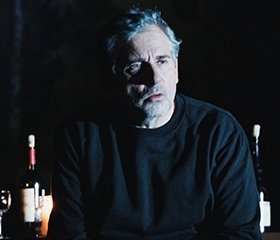When Steve Carell signed on to perform the title role in Uncle Vanya, his first play in decades, he kept his expectations basic. “I wanted to be part of something good,” he told me the other day. “I wanted to support the material” – a new version of the Chekhov work by Heidi Schreck, directed by Lila Neugebauer. “And I wanted to be a strong part of an ensemble. But the truth is that I was looking at the job as an experience more than as a set of expectations.”
And how, I asked, as the production enters its final two weeks, has that experience been? “It has exceeded anything I anticipated,” he replied. “I wasn’t sure how it would feel to be on stage again. But even after all this time” – an interval in which he has played the central role in the phenomenally popular “The Office,” received an Oscar nomination for Foxcatcher, and appeared in a variety of movie roles – Carell said that “being on stage felt remarkably familiar.”
What was a little unexpected, Carell said, was the close relationships he has formed with his fellow actors. “I had forgotten that aspect of theater. It’s a very intimate situation. You’re struggling to figure things out together. You rely on one another. You work long hours. But it’s fun.”
What coaxed Carell back to theater? “It was a number of components,” he answered. “Lila and Heidi were the two things that most drew me in. But I was also seduced by reading the material – Heidi’s version is contemporary without being colloquial – and picturing myself in it.”
There was also the matter of Carell’s kids: a son and a daughter. “When they were little I didn’t want to go out of town, from L.A., for long periods. If you miss your children’s growing up you don’t get that time back. But always somewhere in my mind was the idea of doing a play after they were grown.”
His children are now in their early 20s and Carell was interested in their response to Uncle Vanya. “They’ve never seen the play,” he said. “They’ve never even seen me DO a play. But they enjoyed it.” He added: “My son is not a playgoing guy in general, but he was quite taken. My kids responded to the humor, and I think they understood that the humor gives the story a buoyancy that allows you to feel the weight of the drama that much more. Achieving a balance between humor and drama is the most interesting thing for me as a performer – to straddle those two components.”
Also attractive about this version of Vanya for Carell was the richness of his character’s conception. “He can be played as a very whiny person who blames everybody else,” Carell said. “And he does that to a certain extent. But in this production you are able to sense why Vanya’s mother describes him as ‘her shining light.’ He used to be the fun uncle, a generous man who cared for others and made people laugh. As the play begins he’s lost a lot of that. He’s become the things he doesn’t want to have become – bitter, resentful, cynical. He’s running at a deficit.”
Carell shared further thoughts about his title character. “Like most of the people in the play, he’s reflecting on his life – what he’s achieved and what he hasn’t. The play is evergreen because it deals with the evolution of human lives, especially as we get older and face questions about mortality and whether we have any regrets about how we’ve lived.”
The core material of Uncle Vanya is so rich, Carell said, that he is constantly reflecting about it when he’s not at the theater. “I think about the play all day long, in a good way,” he revealed, adding, “I like to try different things in each performance, to come at some aspect or other from a slightly different angle. It’s my good fortune that this cast is so talented that they can handle whatever I try with them – and give something just as good or better back. There’s not a bad apple in this ensemble and I’m going to miss them when the run is done.”
I asked Carell how the audiences have been for this Uncle Vanya. “We’ve been blessed with attentive theatergoers,” Carell remarked, “sometimes explosively so.” He elaborated: “The character of Waffles” -- portrayed by that expert stage veteran Jonathan Hadary – “has this line, ‘It’s been so long since we’ve had noodles.’ It gets a good laugh quite a bit of the time, but there was this one night that that the whole audience went up for grabs – they exploded. You can’t fully analyze why, on that occasion, they did. It’s an alchemy of elements that you can’t explain.”
Carell added that Chekhov provides the potential for all kinds of alchemy because the construction of his plays “allows the actors to inhabit his world fully and to make new connections frequently. When it seems like you’re completely inside of it – when you’re listening and sensing everything that’s going on – that’s always the best feeling. It means that you’re having a powerful experience – which, as I said, is what I wanted.”
Brendan Lemon is a freelance journalist in New York.
